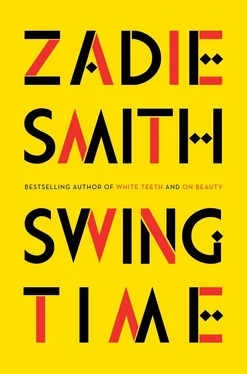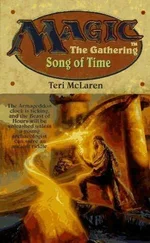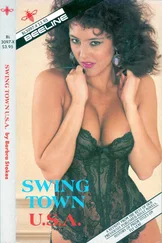I do remember one occasion of shame, a few days before Christmas, a late afternoon on a Saturday, after dance class, after Lambert’s, and I was watching a Fred and Ginger routine, “Pick Yourself Up,” at my flat, with Tracey, over and over. Tracey had an ambition to one day re-create that whole routine herself — this seems to me now like looking at the Sistine Chapel and hoping to re-create it on your bedroom ceiling — though she only ever practiced the male part, it never occurred to either of us to learn Ginger’s part in anything. Tracey was standing in the doorway to the living room, tap dancing — there was no carpet over there — and I was kneeling by the VHS, rewinding and pausing as necessary. My mother was in the kitchen on a high stool, studying. My father — and this was unusual — had gone “out,” with no explanation, just “out,” at about four o’clock, with no stated purpose and no errand to run that I knew of. At a certain point I ventured into the kitchen to get two beakers of Ribena. Instead of seeing my mother bent over her books, earplugs in, oblivious to me, I found her gazing out of the window, her face wet with tears. When she saw me she jumped a little in her skin, as if I were a ghost.
“They’re here,” she said, almost to herself. I looked over to where she was looking and saw my father crossing the estate with two young white people trailing behind him, a boy of about twenty and a girl who looked to be fifteen or sixteen.
“Who’s here?”
“Some people your father wants you to meet.”
And the shame that she felt, I think, was the shame of no control: she could not dominate this situation nor protect me from it as, for once, it had nothing much to do with her. She hurried instead to the living room and told Tracey to leave, but Tracey was deliberately slow collecting up her things: she wanted to get a good look at them. They were a sight. Seen up close the boy had shaggy blond hair and a beard, he wore dirty, ugly, old-looking clothes, his jeans were patched and he had lots of rock-band badges pinned to his frayed canvas rucksack: he seemed to be shamelessly advertising his poverty. The girl was equally peculiar but neater, truly “white as snow,” as in a fairy tale, with a severe black bob cut straight across her forehead and diagonally high at her ears. She was dressed all in black, with a big black pair of Dr. Martens on her feet, and she was petite, with delicate features — excepting a large, indecent bosom which she seemed to be trying to obscure with all this black. Tracey and I stood staring at them. “Time you went home,” said my father, to Tracey, and watching her go I realized how much my ally she was, despite everything, for without her, at that moment, I felt totally undefended. The white teenagers sloped into our small living room. My father asked them to sit, but only the girl did. I was alarmed to see my mother, whom ordinarily I knew to be a completely non-neurotic person, dithering anxiously, stumbling over her words. The boy — his name was John — would not sit down. When my mother tried to encourage him to sit down he wouldn’t look at or reply to her, and then my father said something uncharacteristically sharp, and we all watched as John marched back out of the flat. I ran to the balcony, and saw him down there on the communal grass, not going anywhere — he had to wait for the girl — stamping around in a small circle, crunching the hoar frost underfoot. This left the girl. Her name was Emma. When I came back in my mother told me to sit next to her. “This is your sister,” said my father and went to make a cup of tea. My mother stood by the Christmas tree, pretending to do something useful with the lights. The girl turned to me, and we stared frankly at each other. As far as I could see we had no features in common at all, the whole thing was ridiculous, and I could see that this Emma person thought exactly the same of me. Apart from the comically obvious fact that I was black and she was white, I was big-boned and she was narrow, I was tall for my age and she was short for hers, my eyes were big and brown and hers were narrow and green. But then, at the same moment, I felt we both saw it; the downturned mouth, the sad eyes. I don’t remember thinking logically, I didn’t ask myself, for example, who the mother of this Emma was or how and when she could possibly have known my father. My head wouldn’t go that far round. I only thought: he made one like me and one like her. How can two such different creatures emerge from the same source? My father came back into the room with a tray of tea.
“Well, this is all a bit of a surprise, isn’t it?” he said, handing Emma a mug. “For all of us. It’s a long time since I’ve seen… But you see your mum suddenly decided… Well, she’s a woman of sudden whims, isn’t she?” My sister looked blankly at my father, and he at once gave up whatever he was trying to say and downgraded to small talk. “Now, I’m told Emma does a bit of ballet. That’s something you two have in common. At the Royal Ballet for a little while — full scholarship — but she had to stop.”
Dancing on stage, did he mean? In Covent Garden? As a principal? Or in the “corpse,” as Tracey called it? But no—“scholarship” sounded like a school matter. Was there, then, a “Royal Ballet School”? But if such a place existed why hadn’t I been sent to it? And if this Emma had been sent there, who paid for it? Why did she have to stop? Because her chest was so large? Or did a bullet go right up her thigh?
“Maybe you’ll dance together one day!” said my mother into the silence, which was the kind of maternal inanity in which she very rarely indulged. Emma looked up at my mother fearfully — it was the first time she had dared look at her directly — and whatever she saw there had the power to freshly horrify: she burst into tears. My mother left the room. My father said to me: “Go out for a bit. Go on. Put your coat on.”
I slipped off the sofa, grabbed my duffel coat off the hook and let myself out. I went down the walkway, trying to put what little I knew of my father’s past together with this new reality. He was from Whitechapel, a large East End family, not as big as my mother’s but not far off, and his father had been a minor criminal of some kind, in and out of jail, and this, my mother once explained to me, was why my father put so much effort into my childhood: cooking, taking me to school and to dance class, packing my lunches and so on, all unusual activities for a father, at the time. I was compensation — retribution — for his own childhood. I knew too that he had himself been, at one point, “no good.” Once we were watching TV and something about the Kray twins came on and my father said casually, “Oh, well, everybody knew them, you couldn’t help knowing them, at that time.” His many siblings were “no good,” the East End in general was “no good,” and this all helped consolidate my idea of our own corner of London as a little, clear-aired peak above a general quagmire, into which you might be dragged back into real poverty and crime from several directions. But no one had ever mentioned a son or a daughter.
I took the stairs down to the communal area and stood resting against a concrete pillar, watching my “brother” kick up little scraps of half-frozen turf. With his long hair and beard and that long face he looked like adult Jesus to me, whom I knew solely from a cross on the wall at Miss Isabel’s dance class. Unlike my reaction to the girl — simply that some kind of fraud was under way — looking at the boy I found I could not deny his essential rightness. It was right that he should be my father’s son, anyone looking at him would see the sense of it. What didn’t make sense was me. Something coldly objective took me over: that same instinct that allowed me to separate my voice from my throat as an object of consideration, of study, came to me now, and I looked at this boy and thought: yes, he is right and I am wrong, isn’t it interesting? I could have, I suppose, thought of myself as the true child and the boy as the counterfeit, but I didn’t do that.
Читать дальше












